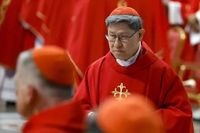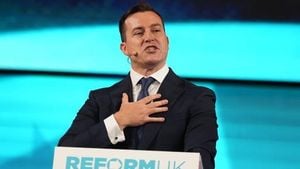As the Vatican prepares for a historic conclave following the death of Pope Francis, Cardinal Luis Antonio Gokim Tagle of the Philippines has emerged as a leading candidate to succeed him. Known affectionately as the "Asian Francis" for his pastoral style and commitment to social justice, Tagle's extensive background and progressive views position him as a prominent figure in the Catholic Church's future.
Born on June 21, 1957, in Manila, Tagle was baptized just a month later in the Cathedral of Manila. His upbringing reflects the rich cultural tapestry of the Philippines, with a family heritage that includes Tagalog and Chinese-Filipino roots. His paternal grandfather hailed from Cantabria, Spain, which adds a unique dimension to his identity.
Tagle's ecclesiastical journey began in 1982 when he was ordained as a priest after completing his theological studies at the Catholic University of America in Washington, D.C., where he earned his doctorate. His early career saw him appointed as the bishop of Imus by Pope John Paul II in 2001, where he garnered a reputation for his humble lifestyle and deep connection with the poor.
In 2011, Pope Benedict XVI elevated him to the position of archbishop of Manila, a role in which he emphasized justice and social equity. His elevation to cardinal in 2012 made him one of the youngest cardinals at the time, further solidifying his influence within the church hierarchy.
Since 2020, Tagle has served as the pro-prefect of the Dicastery for Evangelization, overseeing the Church's missionary activities globally. His leadership at Caritas Internationalis from 2015 to 2022 showcased his commitment to humanitarian efforts, although his tenure was marked by challenges that led to a restructuring of the organization.
As the conclave approaches, Tagle's candidacy has gained traction, with betting houses indicating he is a frontrunner. As reported by William Hill, he surpassed Italian Cardinal Pietro Parolin in betting odds, reflecting a shift in expectations among observers. Tagle's odds stand at 3, while Parolin's are at 3.50, indicating a competitive race for the papacy.
Tagle's approach to various social issues has been characterized by a nuanced understanding. He has expressed opposition to abortion and euthanasia but has also been known for his more moderate stance on other moral questions, advocating for a compassionate dialogue around issues like communion for divorced and remarried couples. This adaptability has earned him both praise and criticism, as he seeks to navigate the complex landscape of contemporary Catholicism.
His background with the Jesuits has played a significant role in shaping his worldview. Tagle studied at the prestigious Ateneo de Manila University, where he earned both his undergraduate and master's degrees before pursuing further studies in the United States. His academic rigor is matched by his pastoral sensitivity, making him a relatable figure for many Catholics.
Despite his qualifications and popularity, some critics have raised concerns about his ability to restore trust in the Church, particularly in light of the sexual abuse scandals that have plagued the institution. Father Jerome Secillano, a spokesperson for the Catholic Bishops' Conference of the Philippines, acknowledged the challenges ahead, stating, "I don't know if a Filipino pope will immediately restore the broken trust. However, it would bring joy and pride to the nation."
In the Philippines, there is hope that a pope from their country could inspire a resurgence in vocations, which have been declining. John Alfred Rabena, chancellor of the Central Seminary at the University of Santo Tomas, noted that each priest currently serves around 9,000 Catholics, highlighting the pressing need for more clergy. The Philippine Church has even established the first National Month of Vocational Awareness to address this issue.
Tagle's potential election as the first Asian pope would not only be a significant milestone for the Church but also a reflection of the growing prominence of Catholicism in Asia. His leadership could symbolize a shift towards a more inclusive and diverse Church that resonates with the realities of the global community.
As the conclave unfolds, the eyes of the world will be on the cardinals as they deliberate in secrecy, seeking a leader who can guide the Church through its current challenges. The conclave's rituals, including the burning of ballots to signal the outcome, will be closely watched, with many hoping for a papacy that continues the progressive vision of Pope Francis.
In the coming days, the cardinals will cast their votes, and the anticipation builds as Catholics worldwide await the emergence of white smoke from the Sistine Chapel, signaling the election of a new pope. Whether it will be Tagle or another candidate remains to be seen, but the implications of this election will undoubtedly shape the future of the Catholic Church.
As Tagle's candidacy gains momentum, his supporters emphasize his ability to connect with the faithful, particularly the youth. A seminarian, Neil Pena, expressed optimism, stating, "A pope who speaks Filipino, in simple Filipino, speaking as if he is talking directly to you... will be an inspiration." This sentiment resonates with many who believe that a Filipino pope could rejuvenate the Church's presence in the Philippines and beyond.
Ultimately, the conclave represents a pivotal moment for the Catholic Church, with Cardinal Tagle standing at the forefront of this historic transition. His journey from Manila to potentially the papal throne reflects not only his personal achievements but also the evolving landscape of the Church in the 21st century.





